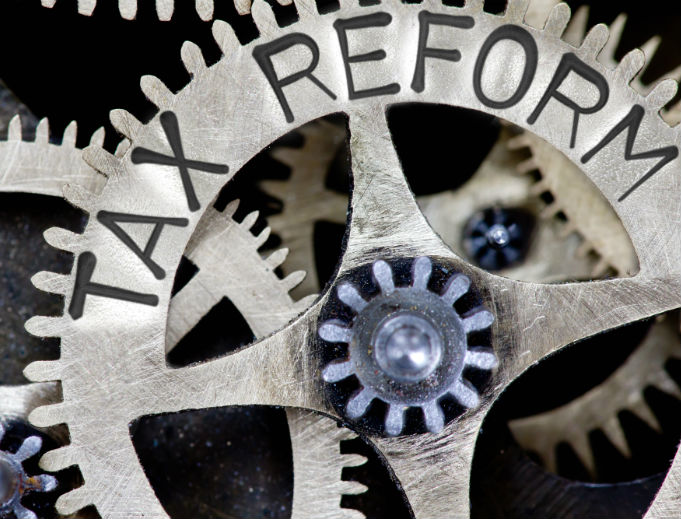Republican Tax Reform Goes Through the Wringer
Analysts discuss the pros and cons of the GOP’s proposal.

WASHINGTON — Though some analysts fret about trillions of dollars in possible lost tax revenues and skyrocketing deficits, other economists say the tax-reform bill unveiled Nov. 2 by House Republicans has the potential to help jump-start the nation’s moribund economy.
Several economic professors and analysts interviewed by the Register said the legislation could benefit the United States by lowering the country’s corporate income tax rate from 35% to 20%, bringing it more in line with other developed nations, and simplifying an intricate federal tax code that currently runs more than 70,000 pages.
“There is just no justification for a tax code that is that complicated,” said David Hebert, an economics professor at Aquinas College in Grand Rapids, Michigan, who told the Register that cutting the corporate tax rate would give companies an incentive to incorporate and stay in the United States, “or, at the very least, to not have to engage in all these ridiculous accounting practices just to try to save on some taxes,” Hebert added.
Thomas Gresik, an economics professor at the University of Notre Dame, also told the Register that he believes cutting the corporate tax rate will make U.S. businesses more competitive in the global economy and attract more investment in the United States.
“The reality is we are living in a world where the United States has now got an uncompetitive corporate income tax rate, and that affects jobs in this country, and that affects wages in this country,” Gresik said.
But other analysts criticize the Republican tax plan as a massive giveaway to the country’s wealthiest taxpayers that they say will run up deficits of up to $1.5 trillion over the next decade and shift the taxpaying burden to middle-income households.
“These tax cuts are clearly biased in favor of the wealthy. The wealthiest 10% of the country is going to get the vast majority of these cuts,” said Daniel Finn, a theologian and economics professor at St. John’s School of Theology and Seminary in Collegeville, Minnesota.
Finn told the Register that the GOP plan is based on a false premise that Americans are overtaxed. According to the nonpartisan Tax Policy Center, U.S. tax revenues equal about 26% of the country’s gross domestic product. By comparison, that rate is about 34% for other developed nations in the Organization for Economic Cooperation and Development (OECD).
If the United States were to raise its average tax rate to that of the other industrialized countries in the OECD, Finn argued, the federal government would have an extra $1.5 trillion to spend every year.
“It seems to me that when the government says it can’t do many things that it needs to do, like even just fix bridges, much less take care of people whose needs are obvious, there’s a real moral problem with the assumption that we need to cut taxes,” Finn said.
As currently written, the Republican tax plan would reduce the number of federal income tax brackets from seven to four, with the top bracket remaining at 39.6% for individuals who earn more than $500,000 a year and married couples who earn more than $1 million a year.
The bill nearly doubles the standard deduction; the deduction for married couples filing jointly would increase from $12,700 to $24,000 and from $6,350 to $12,000 for singles.
U.S. Bishops
In a Nov. 9 letter to members of the House of Representatives, the U.S. Conference of Catholic Bishops strongly criticized central aspects of the U.S. House of Representatives’ legislation, known as the “Tax Cuts and Jobs Act.”
The letter was signed by Bishop Frank Dewane of Venice, Florida, chairman of the U.S. bishops’ Committee on Domestic Justice and Human Development; Bishop Oscar Cantú of Las Cruces, New Mexico, chairman of the Committee on International Justice and Peace; and Bishop George Murry of Youngstown, Ohio, chairman of the Committee on Catholic Education.
The USCCB letter cited estimates of the bill’s impact by the nonpartisan congressional Joint Committee on Taxation that found it would increase taxes for Americans earning between $10,000 and $40,000 annually, whereas those earning more than $1 million would see a drop in their tax bills. “No tax-reform proposal is acceptable that increases taxes for those living in poverty to help pay for benefits to wealthy citizens,” the USCCB letter stated.
While the USCCB letter did praise some aspects of the tax-reform bill, including “expanded access to schools of choice” and the legislation’s recognition of unborn children as eligible beneficiaries for parents’ 529 education savings accounts, it was sharply critical of the proposed elimination of several tax credits and deductions currently available to assist lower-earning taxpayers. It also criticized provisions for stricter rules around parents’ Social Security numbers that, according to the bishops, will make it “more difficult for immigrant taxpayers to receive the Child Tax Credit or the Earned Income Tax Credit for their families or to receive assistance in seeking advancement through education.”
“The Tax Cuts and Jobs Act of 2017 contains many fundamental structural flaws that must be corrected,” stated the letter. “As currently written, the proposal is unacceptable.”
Earlier, the bishops’ conference outlined six moral principles that it believes Congress should consider as it debates tax reform:
- care for the poor,
- strengthening families,
- maintaining the tax code’s progressivity,
- raising enough revenue for the common good,
- avoiding cuts to anti-poverty programs, and
- incentivizing charitable giving and development.
Child Tax Credit Discussion
In some family-friendly policy changes, the bill expands the child tax credit for children under age 17 from $1,000 to $1,600 and creates a new $300 tax credit for “each parent and non-child dependents,” according to the House Republican leadership.
However, the legislation eliminates personal exemptions — taxpayers are currently allowed to claim $4,050 exemptions for themselves, a spouse and dependents — which some analysts say could help negate any tax relief for families with three or more children.
Abby McCloskey, an economist who has advised multiple Republican presidential campaigns, told the Register that the child tax credit would need to be increased much more significantly in order to help a parent be able to stay home or take a longer leave of absence from work for the birth of a child.
“It’s just not a significant amount of money, I think, to influence those types of decisions,” McCloskey said.
Jay Richards, an economics professor at The Catholic University of America’s Busch School of Business and Economics, told the Register that he would have liked to have seen a deduction of around $2,000 for each individual child to help offset the possible elimination of the adoption tax credit.
The adoption credit provides refundable tax credits for individuals to a maximum of $13,460 to cover adoption costs. It has substantial support among pro-lifers, including New Jersey Rep. Chris Smith, co-chairman of the bipartisan Congressional Pro-Life Caucus. On Nov. 9, the credit was restored to the House bill.
“Nobody who follows these things will be fully satisfied,” Richards said. “Clearly, the Republican House leadership made some compromises, but I think, [regarding] cutting the corporate income tax rate, an increase in the child deduction and the simplification of some of the different brackets, those are all steps in the right direction.”
Other Elements
Despite some early speculation on possible changes to 401(k) accounts, the House bill does not propose lowering the cap on pretax contributions from $18,000 today. However, taxpayers in some parts of the country would no longer be able to deduct state and local taxes, though they would be allowed to deduct up to $10,000 in property taxes.
In a much-criticized move, the bill proposes curbing deductions for mortgage interest on newly purchased homes; if passed into law, homeowners would be able to claim a deduction for interest paid on mortgage debt up to $500,000, down from $1 million today.
Richards said wealthier taxpayers would “feel the pain” of the mortgage interest deduction being capped. But the House bill includes provisions that wealthier Americans will surely approve of, such as the proposed elimination of the estate tax and the alternative minimum tax.
American wage earners at the upper end of the middle-income scale may end up paying more taxes in a higher bracket, but Gresik argued that most other groups will either see no change or a reduction in their marginal tax rates.
“For a lot of folks, there is going to be a rate reduction,” Gresik said. “But at same time, there are going to be fewer deductions that they can take.”
McCloskey said she favors the bill’s move toward simplifying the tax code.
“I think widening the standard deduction, reducing the number of brackets — those types of things that make it easier for wide swaths of the population to file taxes — is an improvement over the status quo,” she said.
Criticism
But some early independent analyses are not in the Republicans’ favor. Howard Gleckman, a senior fellow with the Tax Policy Center, wrote that the House bill would likely increase the federal deficit by “far more than” a previously estimated $1.5 trillion over the next 10 years. Gleckman also said the bill would not lead to a 3% permanent economic growth as promised by House Republicans, and he argued that “many middle-income households are likely to pay more under this plan, not less.”
Leading congressional Democrats, especially Sen. Elizabeth Warren of Massachusetts, are hammering the GOP leadership on the bill. Warren said in prepared remarks that the Republican tax plan is “the same warmed-over, trickle-down plan” that delivers “massive tax cuts to millionaires and giant corporations and kicks working families to the curb.”
Finn, from St. John’s School of Theology and Seminary, also criticized the premise that corporate tax cuts lead to investment and new jobs, telling the Register that firms invest in new business ventures and workers when they think they can make more money, not because they pay less in taxes. As for the bishops’ stated concerns for poor and working families, Finn doesn’t think they will be pleased with the bill.
“The problem is going to be that if you reduce tax revenues, there will be less money to spend,” Finn said. “Where would those cuts come from? Well, we’ve seen the pattern from this Congress, and it’s not to be mindful that the poor are in need. Rather, it’s been to cut welfare and health care spending.”
Support for Streamlining
Meanwhile, other analysts argue that streamlining the tax system so that more people can file their taxes more easily and cutting corporate taxes will cut wasteful spending and generate billions of dollars in new business ventures that will translate to new tax revenues.
“I think the time for tax reform is now,” said McCloskey, who argued that simplifying the tax code is “one of the most significant moves we can make to jump-start the economy, improve wages and provide relief” to millions of taxpayers.
Said McCloskey, “The economy could use some good decisions coming out of Washington.”
Register correspondent Brian Fraga writes from Fall River, Massachusetts.
- Keywords:
- brian fraga
- donald trump
- tax reform

















